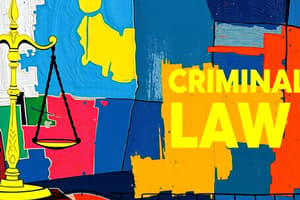Podcast
Questions and Answers
What are the three main types of criminal offences?
What are the three main types of criminal offences?
- Traffic offences, public order offences, property offences
- Summary conviction offences, indictable offences, hybrid offences (correct)
- Felonies, misdemeanours, infractions
- Civil offences, minor offences, major offences
Motive alone is sufficient to prove someone's guilt in a crime.
Motive alone is sufficient to prove someone's guilt in a crime.
False (B)
What is the purpose of the Criminal Code in Canada?
What is the purpose of the Criminal Code in Canada?
To outline criminal laws and define offences and penalties.
If all jurors do not agree, it results in a ______.
If all jurors do not agree, it results in a ______.
Which of the following is a common defence in court?
Which of the following is a common defence in court?
What does aiding or abetting a crime involve?
What does aiding or abetting a crime involve?
The steps of the general criminal process include bail decisions and evidence presentation.
The steps of the general criminal process include bail decisions and evidence presentation.
Match the following terms with their definitions:
Match the following terms with their definitions:
Who cannot serve as a juror in Canada?
Who cannot serve as a juror in Canada?
A hung jury means that the jury has reached a unanimous decision.
A hung jury means that the jury has reached a unanimous decision.
What is the role of 'actus reus' in a crime?
What is the role of 'actus reus' in a crime?
The Criminal Code in Canada provides a standardized legal framework defining __________, defenses, and procedures for justice.
The Criminal Code in Canada provides a standardized legal framework defining __________, defenses, and procedures for justice.
How many jurors are typically required to reach a decision in a criminal trial?
How many jurors are typically required to reach a decision in a criminal trial?
Sequestering a jury is meant to expose them to external influences during deliberations.
Sequestering a jury is meant to expose them to external influences during deliberations.
What happens if a jury cannot agree on a verdict?
What happens if a jury cannot agree on a verdict?
Match the types of evidence with their admissibility status:
Match the types of evidence with their admissibility status:
Flashcards
Criminal Offence Categories
Criminal Offence Categories
Criminal offences are categorized as summary conviction (less serious), indictable (more serious), or hybrid (can be either).
Motive in Crime
Motive in Crime
Motive is the reason behind committing a crime; it explains why but doesn't prove guilt.
Criminal Defenses
Criminal Defenses
Defenses like duress (forced), alibi (elsewhere), necessity (urgent) and sleepwalking (involuntary) argue lack of intent or control.
Criminal Process Steps
Criminal Process Steps
Signup and view all the flashcards
Hung Jury
Hung Jury
Signup and view all the flashcards
Aiding/Abetting
Aiding/Abetting
Signup and view all the flashcards
Canadian Criminal Code Purpose
Canadian Criminal Code Purpose
Signup and view all the flashcards
Summary Conviction Offences
Summary Conviction Offences
Signup and view all the flashcards
Abetting
Abetting
Signup and view all the flashcards
Actus Reus
Actus Reus
Signup and view all the flashcards
Jury Sequestration
Jury Sequestration
Signup and view all the flashcards
Criminal Trial Jurors
Criminal Trial Jurors
Signup and view all the flashcards
Juror Eligibility
Juror Eligibility
Signup and view all the flashcards
Inadmissible Evidence
Inadmissible Evidence
Signup and view all the flashcards
Criminal Code
Criminal Code
Signup and view all the flashcards
Study Notes
Criminal Offences and Categories
- Three main types of criminal offences: summary conviction (less serious), indictable (more serious), and hybrid (can be either).
- Examples: theft (hybrid), murder (indictable).
- Categories determine court procedure and consequences.
Motive in Crime
- Motive is the reason behind a crime.
- It explains but does not prove guilt.
- Motive is helpful context, but needs actus reus and mens rea for conviction.
Defences in Court
- Duress: Forced to commit a crime under threat.
- Alibi: The defendant was elsewhere when the crime occurred.
- Necessity: Urgent situation forced a crime (e.g., breaking a law to save a life).
- Sleepwalking defence: Actions were involuntary due to unconsciousness.
- Defences argue lack of intent or control, potentially reducing or eliminating liability.
Criminal Process Steps
- Arrest by officers.
- Accused released or held pending hearing (bail decision).
- Hearing to decide if the case goes to trial.
- Crown and defence present evidence.
- Judge instructs the jury on applicable laws.
- Jury deliberates and reaches a verdict.
- Process ensures procedural fairness and the accused’s defensive opportunity.
Hung Jury
- A hung jury occurs when required jurors do not agree.
- The trial may need to be restarted.
- Unanimous agreement is crucial in criminal cases to avoid reasonable doubt.
Aiding and Abetting
- Aiding means actively assisting someone commit a crime (e.g., providing a weapon).
- Abetting means encouraging or promoting the crime (e.g., giving instructions).
- Aiding/abetting holds people accountable for facilitating crimes, even if not directly involved.
Criminal Code Purpose
- The Criminal Code outlines criminal laws and penalties in Canada.
- It aims for consistent application nationwide.
- Provides a standardized legal framework for offences, defences, and procedures.
Jury Service Eligibility
- Jurors must be adult citizens.
- Must understand English. Cannot have significant physical/mental impairments affecting their judgment or serious indictable convictions.
- Ineligible groups: police, politicians, prison guards, medical professionals.
- Criteria ensure impartiality and competence.
Jury Deliberations and Unanimity
- 12 jurors are required for a criminal trial.
- A unanimous jury decision is needed for a valid verdict.
- A hung jury results if all jurors do not agree.
- The possibility of a new trial arises in this scenario.
Jury Sequestration
- Sequestration isolates the jury from external influences during deliberations.
- This safeguards the integrity of their decision by preventing outside biases.
Actus Reus
- Actus reus is the physical criminal act or omission.
- It must be voluntary.
- It's the tangible action of committing a crime, not thoughts or intentions.
Inadmissible Evidence
- Some evidence, like gruesome evidence or lie detector test results, is inadmissible in court.
- Such evidence might be unreliable or unduly prejudice a jury.
Studying That Suits You
Use AI to generate personalized quizzes and flashcards to suit your learning preferences.





